You’re probably familiar with that uncomfortably full, swollen feeling in your belly after a meal or even just a light snack. Sometimes you may even feel bloated on an empty stomach! Sometimes it is downright painful, and your stomach might even visibly inflate. I have written this article to help you better understand the causes of bloating, potential reasons as to why it may be a bothersome problem for you, and ways to reduce it . Rest assured, there are steps you can take to alleviate the discomfort you have been feeling!
BLOATING IS COMMON
Bloating occurs when your digestive system is irritated, or when you have excess liquids, solids, or gas in your stomach. Some people, especially individuals who struggle with Irritable Bowel Syndrome (IBS) are hypersensitive, so they may feel pressure even without excess food or liquid. Water retention, while not the same as bloating, is closely linked to bloating, since it causes the same type of pressure in the abdomen.
Although it may not seem like it, especially when your stomach is distended and you are feeling especially uncomfortable, bloating is very common. In fact, population-based studies have shown that anywhere from 16-30% of people have struggled with it.
10 COMMON CAUSES OF BLOATING
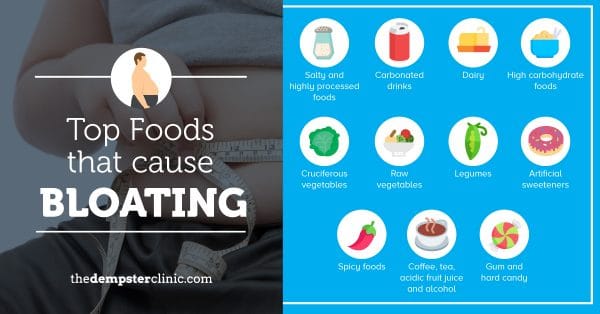
1. Irritable Bowel Syndrome
If your symptoms go hand-in-hand with incomprehensible abdominal pain, and gas, you might be one of the many Canadians who suffers from Irritable Bowel Syndrome (IBS). Everyone has different triggers, but there are certain foods known to be common culprits for digestive distress. One first-line strategy to reduce bloating is to avoid the foods most notorious for inducing symptoms of IBS.
If this does not help, seeking medical treatment could greatly relieve your symptoms. Keep in mind that conventional medications used to treat IBS can actually make bloating worse, so be wary if your doctor goes straight to the prescription pad. I recommend a functional medicine approach, which provides personalised solutions to your IBS symptoms.
2. Small Intestinal Bacterial Overgrowth (SIBO)
SIBO is a common gastrointestinal disorder in which bacterial overgrowth in the gut inhibits nutrient absorption, which can lead to a number of serious health conditions, including Chronic Fatigue Syndrome and Leaky Gut Syndrome. This disorder carries with it a host of digestive symptoms. In addition to bloating, it can cause diarrhea, gas, abdominal pain, and irregularity. Another key symptom is the inability to tolerate sweet or starchy foods. I recommend SIBO testing for patients who exhibit symptoms of IBS alongside an inability to tolerate sweet or starchy foods.
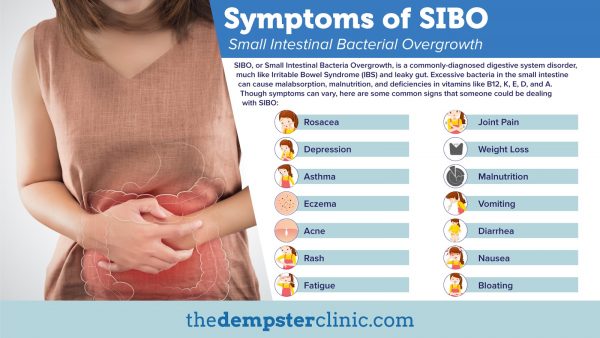
3. Histamine Intolerance
Histamines are compounds that act as neurotransmitters. They send important messages between your brain and your body. In addition to playing a role in the function of your immune and nervous systems, they also aid in the normal digestion of food. Histamine intolerance occurs when you have an excess of histamines in your system, which leads to a whole slew of mental and physical symptoms.
If your bloating goes hand-in-hand with anxiety, difficulty sleeping, dizziness, fatigue, nausea, an increased heart rate, or chronic nasal congestion, these may be signs that you are experiencing histamine intolerance.
To rule out histamine intolerance as a cause of bloating, try a two-week elimination diet that eliminates histamine-rich foods. These foods include cured meat, alcohol, aged cheese, nuts, certain kinds of fish, overripe fruit, seeds, soy products, fermented foods, and sweetened beverages. If histamine intolerance is the source of your bloating, you may find relief after eliminating these foods from your diet.
4. Anxiety and Stress
Chronic stress and anxiety extend far beyond mental and emotional symptoms; patients also experience unpleasant physical symptoms as a result of emotional dysregulation. This can manifest as unexplained aches and pains, headaches, chronic fatigue, and gastrointestinal distress. Interestingly, your conscious brain is extremely connected to your gut, meaning that a stressful state of mind can trigger digestive dysfunction.
It is common for a bout of anxiety to cause bloating, which can be attributed to two factors. First, high stress levels can cause you to hyperventilate, which makes you breathe in such a way that you swallow a large excess of air. Additionally, stress affects your body’s ability to process nutrients, which can throw your digestive tract off balance.
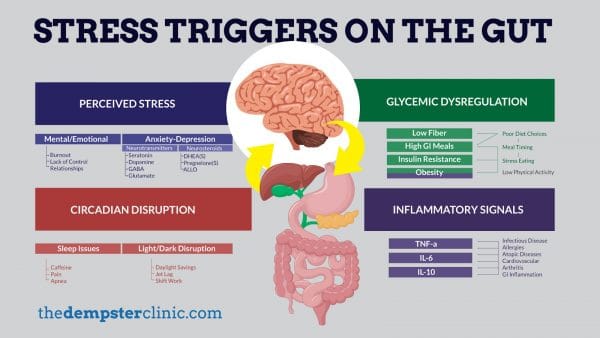
5. Overeating
Food addiction and overeating are common, but the side effects take a serious toll on your health. Much of the discomfort associated with overeating is similar to that of bloating. If you’re experiencing symptoms of bloating after consuming large meals, the problem may be that you are simply too full. Try to reduce portion sizes and chew your food slowly and mindfully. This gives your body time to send your brain the “full” signal before you feel uncomfortably full.
Remember, the digestive process begins in the mouth, so chewing is actually an important part of healthy digestion! Additionally, chewing more slowly prevents you from swallowing excess air.
6. Excessive Simple Carbohydrate Consumption
Carbohydrates are essential components of a well-balanced diet and provide your body with ready-to-use fuel. However, overconsumption can lead to water retention and leave you feeling bloated. “Simple” carbohydrates, found in foods like white bread, cookies, and soda, are the most dangerous because your bloodstream absorbs them almost instantaneously. “Complex” carbohydrates aren’t as risky when it comes to bloating because they take longer to be digested.
For optimal digestive health, make a point to eat less simple carbohydrates. Instead, integrate more complex carbohydrates like fruits, vegetables, and whole grains into your diet.
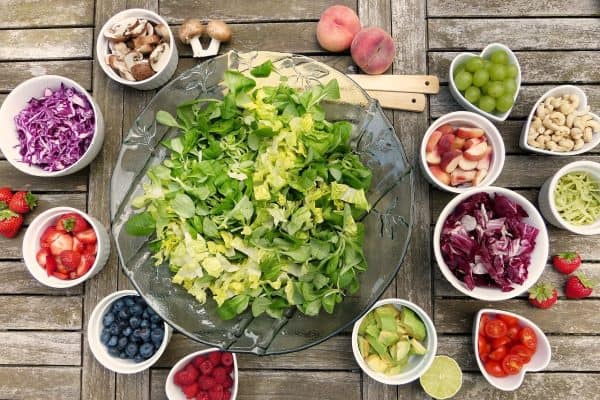
7. Dairy
Dairy can upset your digestive system in a number of ways. It contains lactose, a type of sugar. If you are lactose intolerant or have a lactose sensitivity (many people do), your body has a more difficult time digesting lactose. Dairy products also tend to be high in fat content, which can trigger IBS-like symptoms. Finally, the pasteurization process that most dairy products go through generates inflammatory molecules that are difficult to digest.
Try reducing dairy products altogether, or at least consume less of them. There are plenty of plant-based alternatives, like almond or soy milk.
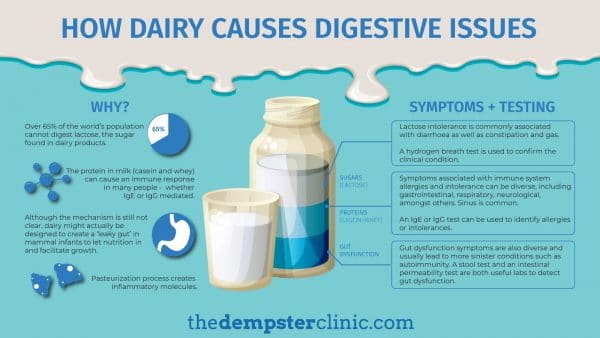
8. Carbonated Beverages
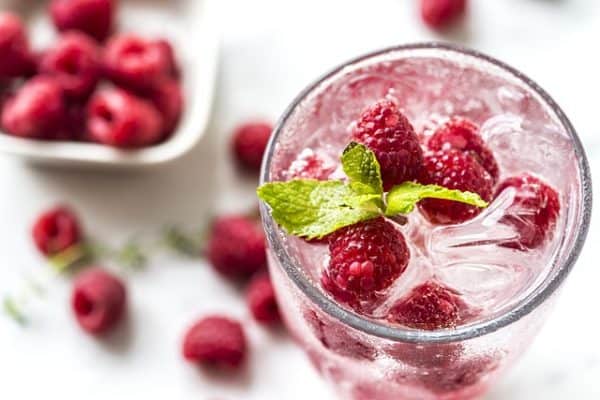
Soft drinks, champagne, beer, and soda water are all prime examples of carbonated beverages. Since they are full of air bubbles, they rapidly fill up your digestive system with gas, leading to a full, bloated belly. To make matters worse, many of these drinks are laden with refined sugar, which can cause water retention and exacerbate your symptoms.
If you experience bloating and tend to drink carbonated beverages regularly, there is a good chance that they are contributing to your symptoms. To ease your pain, eliminate these beverages from your diet, or at least reduce the amount of these drinks that you consume.
There are plenty of refreshing, healthy alternatives. Fresh, natural, homemade juice can be a satisfying replacement. You can also add fresh sprigs of mint or citrus fruit wedges to water for a flavorful, calorie-free substitution.
9. Celiac Disease
Celiac disease refers to an intolerance to gluten, a protein found in wheat, barley, and rye. Consuming gluten sets off an immune response in your small intestine, which can lead to a host of symptoms: anemia, diarrhea, weight loss, fatigue, and – you guessed it – bloating.
The only way to know for sure if you have celiac disease is via celiac testing, which involves a simple blood test to measure the levels of antibodies in your bloodstream. It is also possible that you are sensitive to gluten, which produces similar, but less severe symptoms than celiac disease.
To see if celiac intolerance or sensitivity is the source of bloating, try eliminating gluten from your diet for a couple of weeks. This means that you should avoid foods such as pastas, breads, and crackers. You should also read the labels of packaged food carefully, as gluten often lurks in unsuspecting food sources.
10. Fluctuating Hormones in Women
Women experience natural fluctuations in progesterone and estrogen throughout their lives. Since these hormones are connected to your gut, fluctuations can lead to digestive problems like bloating. These types of fluctuations occur during pregnancy, perimenopause, menopause, and throughout the menstrual cycle. Oral contraceptives also influence the levels of progesterone and estrogen in your body.

Different levels of these hormones impact the smooth muscles of the digestive tract, and low levels of sex hormones can lead to constipation-induced bloating.
Certain lifestyle changes have the power to lessen the negative effects of hormonal changes. Adequate sleep, regular exercise, drinking plenty of water, and abstaining from oral contraceptives may all help alleviate bloating. Avoiding fatty foods, gluten, and dairy may also ease symptoms.
TIRED OF FEELING BLOATED? HERE’S WHAT YOU SHOULD DO
In addition to the suggestions discussed above, there are several other natural remedies for bloating. Some of these tips are tools to help you pinpoint the source of the bloating, and others are simple natural remedies that may help reduce bloating regardless of the cause.
Peppermint Oil
Peppermint oil calms irritated digestive muscles by easing muscle spasms, which are often responsible for bloating. It has been found to be especially soothing for individuals suffering from IBS, and studies have also shown that it helps people suffering from celiac disease, SIBO, or lactose intolerance.
Use Digestive Spices
Fennel and ginger are both known to aid in digestion. You can easily add these spices to many recipes, and you can also steep them in hot water for a natural, homemade digestive tea.
Follow a Low-FODMAP Diet
Following a low-FODMAP diet may significantly reduce the amount of bloating you experience.The acronym FODMAP stands for ‘Fermentable Oligo Di-and-Monosaccharides and Polyols.’ Simply put, FODMAPS are a group of sugar-based carbohydrates that, while easily fermented, not completely absorbed by your body when you eat them. FODMAPs can draw excess moisture into the intestine and offset the balance of healthy bacteria in your gut microbiome, resulting in bloating and other symptoms of IBS.
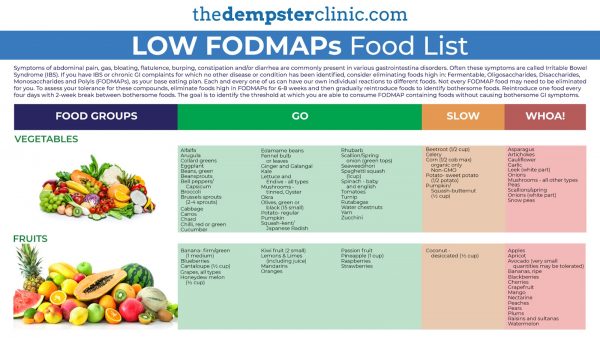
Eat a Diet Rich in Soluble Fiber
One study concluded that IBS-constipation is the leading symptom that causes measurable bloating. Eating foods high in soluble fiber can reduce bloating from constipation, and it is even better if you make sure that they are also low in FODMAPs.
Here are some excellent, FODMAP-free soluble fiber sources:
- Avocados
- Broccoli
- Carrots
- Brussels sprouts
- Kiwi
- Eggplant
- Oatmeal
- Strawberries
- Turnips
- Summer Squash
- Okra
Take Prebiotics and Probiotics

Prebiotics and probiotics are both naturally-occurring substances that can truly transform your gut health. Taking supplements or eating foods rich in one or both of these substances improves your body’s ability to absorb nutrients and reduces IBS symptoms. Keep in mind that some fermented foods, while high in probiotics, can have high levels of FODMAPS or lactose. If you suspect that FODMAPs or dairy are contributing to bloating, you can still benefit from probiotic-rich fermented foods.
Here are some examples of dairy-free fermented foods that are low in FODMAPS:
- Tempeh
- Coconut yogurt
- Red cabbage
- Miso
HEAL YOUR GUT AND FEEL YOUR BEST AT THE HEALTHY GUT INSTITUTE
Join the Healthy Gut Institute, a highly effective 6-week program created by Dr. John Dempster, ND that will help you overcome unrelenting gut health issues. This program is for anyone suffering from symptoms of IBS, inflammatory bowel disease (IBD), colitis, SIBO, Crohn’s disease, Leaky Gut Syndrome, or other types of gut disease. You’ll learn the single most important lifestyle factor for your health, the best essential oil for optimal gut health, the three best fermented foods for gut health, and how to HEAL and SEAL leaky gut permanently.
This is a guided, step-by-step course with guided modules to help you be pain-free in six weeks or less and includes:
- Over 50 educational videos to help you overcome your gut issues
- Access to the Healthy Gut Institute private Facebook Page Support Community and Live Question and Answer sessions
- Healthy Gut Institute Shopping List
- 10 BONUS interviews with the leading experts in gut health
- Over 70 downloadable worksheets and guides
- FODMAP foods list
- Gut health supplement guide
- 60 day money back guarantee
You can restore your gut health and live a pain-free life. Click here to enroll in the Healthy Gut Institute today!
CREATING THE BEST DIETARY PLAN FOR YOU AT THE DEMPSTER CLINIC- CENTER FOR FUNCTIONAL MEDICINE
Commonly, bloating is a result of dietary choices. I hope that the suggestions above will help you reduce symptoms. However, gut health is complicated, and you may need professional help to determine the best course of action. Sometimes bloating is the sign of a more serious health condition. If you do not notice improvement after tweaking your diet, I recommend a detailed functional medicine analysis. At The Dempster Clinic- Center for Functional Medicine, I can work with you to create an individualised solution to your health problems.



